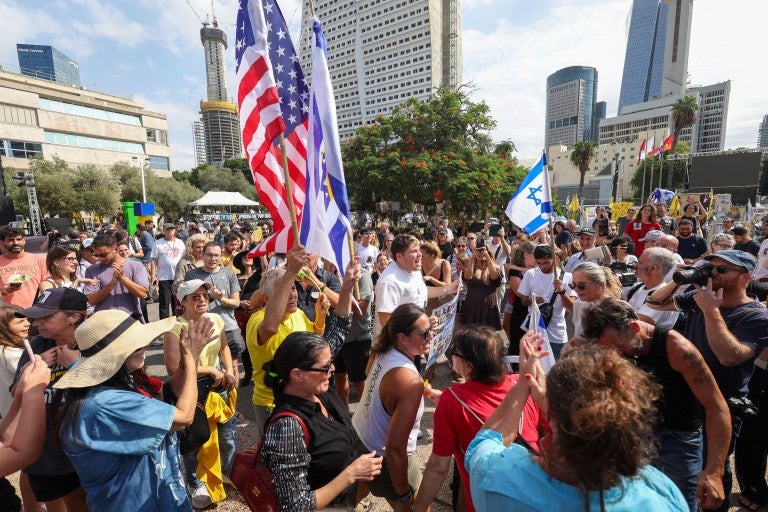June 19, 2020 — Washington, D.C.
This piece originally appeared in The Hill.
Simultaneous crises of the pandemic, economic decline and the consequences of systemic racism are straining the fabric of American society. The relationship between U.S. Latinos and Jews may offer a model for pulling together disparate communities in challenging times.
Latinos and Jews are jointly confronting the impact of COVID-19 on our communities and American society. In addition to the health and socio-economic challenges, we and other minorities are jointly facing bigotry and dangerous conspiracy theories, exacerbated by misinformation that is spreading on social media platforms.
Hate crimes have risen steadily across the U.S. since 2016, according to the Center for the Study of Hate and Extremism. Violent hate crimes against Latinos hit its peak in 2018. A Pew poll reported that nearly four out of 10 Latinos in the U.S. said they had experienced discrimination in the last year. Meanwhile, the most recent FBI statistics on hate crimes show nearly 60 percent of hate crime attacks in 2018 targeted Jews and Jewish institutions.
In addition, certain policies introduced before and during the public health crisis, such as tightened restrictions on immigration and asylum, further jeopardize the time-honored American narrative of a nation enriched by its many waves of immigrants. Closing borders not only redefines the American ideal. It fuels the sources of anti-immigrant and antisemitic animus — often one and the same.
The Latino Jewish Leadership Council (LJLC), convened by the American Jewish Committee (AJC) in 2017, recently called for measures to thank and protect immigrants, many of whom serve as essential workers and are suffering higher rates of infections, fatalities and economic hardship.
This council also urged U.S. political and civil society leaders to act with civility, compassion, mutual respect and solidarity and promote the notion of unity. Our nation's strength and resilience derive precisely from our democratic foundation, spirit of pluralism and sense of inclusiveness.
Six million immigrants, including a large proportion of Latinos, serve on the frontlines, working to help keep Americans safe, healthy and fed, according to the Migration Policy Institute. For example, nearly 30 percent of physicians and almost 40 percent of home health aides are immigrants. Many sanitize hospitals, produce food on farms and in factories and stock shelves or interact with customers at supermarkets.
Latinos are feeling economic dislocations disproportionately more than others. A recent Pew Research Center survey found that compared with 33 percent of all U.S. adults, 49 percent of Latinos say they or someone in their household has taken a pay cut or lost a job — or both — because of the pandemic.
The LJLC has expressed concern for the rise in antisemitism and anti-Latino hatred. The economic anxiety and uncertainty felt by all Americans fuels victim blaming and conspiracy theories. For example, in response to the alarming number of COVID-19 cases among minorities, the U.S. Surgeon General instructed Latinos and others to lessen drinking, smoking and drug use, implying they were to blame for the higher rates of disease. He later clarified that all Americans should take similar precautions.
Victim blaming has been directed as well toward the Jewish community. Protesters of shelter-in-place orders have compared state public health measures to Nazi tactics, and Jews have been accused of creating, spreading, or profiting from the virus.
Sadly, we have witnessed how vitriol can escalate to violence. In October 2018, the deadliest attack on Jews in American history, left 11 congregants dead at a Pittsburgh synagogue. On social media, the killer professed that he could no longer watch Jews bring “invaders in that kill my people.” Less than a year later, a gunman who intended to “shoot as many Mexicans as possible” slaughtered 22 people inside an El Paso, Texas Walmart store, the deadliest attack against Latinos.
That’s why the LJLC and the Latino-Jewish Congressional Caucus endorsed the National Opposition to Hate, Assaults, and Threats to Equality (NO HATE) Act.
The bipartisan bill would improve hate crime reporting with grants to empower state and local governments to train law enforcement, create reporting hotlines, direct resources to minority communities, and conduct public educational forums. In exchange for federal funds, agencies would have to submit hate crimes data to the FBI.
COVID-19 has accentuated the extent of domestic, regional and global interdependence and cooperation during a public health crisis and in its aftermath. No community and no country can be successful in tackling these monumental challenges on its own. Thankfully, U.S. Latinos and Jews can draw from a deep reservoir of historical, ethical and pragmatic affinities spanning many decades as they stand once again shoulder to shoulder with their ethnic, racial and religious partners, to face the pandemic and its dire consequences head on.
Dina Siegel Vann is director of the American Jewish Committee (AJC) Arthur and Rochelle Belfer Institute for Latino and Latin American Affairs and Ramiro A. Cavazos is President & CEO of the United States Hispanic Chamber of Commerce.



